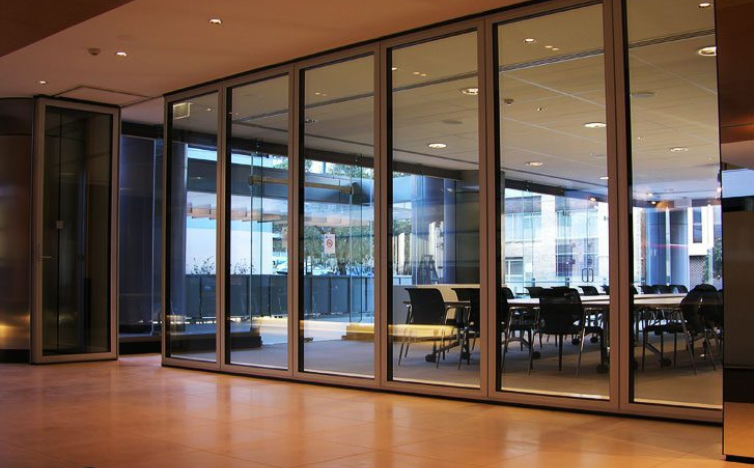As workplace environments evolve, the need for noise control and privacy has become more critical, especially in private offices and conference rooms where confidentiality and concentration are essential. Acoustic glass solutions for offices effectively minimize sound transmission, creating a quieter, more focused environment.
What is Acoustic Glass?
Acoustic glass, or soundproof glass, is designed to reduce sound waves passing through glass surfaces. It usually consists of multiple layers of glass separated by an acoustic interlayer, typically made of polyvinyl butyral (PVB), which dampens noise. The result is a highly effective barrier that limits sound transmission and creates a peaceful indoor environment.
Benefits of Acoustic Glass in Office Spaces
Acoustic glass solutions offer various advantages to office settings:

- Enhanced Privacy: Acoustic glass reduces the chance of conversations leaking into adjoining rooms, ensuring confidentiality in sensitive discussions.
- Improved Concentration: By dampening external noise, acoustic glass helps employees maintain focus, leading to higher productivity.
- Modern Aesthetic: Acoustic glass integrates seamlessly into modern office designs, offering a clean, open look without compromising functionality.
- Eco-Friendly Option: Some types of acoustic glass are made from sustainable materials, which can contribute to eco-friendly building designs.
Why Acoustic Glass is Ideal for Private Offices
In private offices, acoustic glass plays a significant role in enhancing privacy and creating an environment conducive to focused work. Private offices are often used for confidential discussions, sensitive phone calls, or individual tasks that require concentration. Without soundproofing, these rooms can become vulnerable to external noise, affecting the quality of work and the confidentiality of conversations.
Acoustic glass prevents sound leakage effectively, ensuring that conversations remain within the room and external noises do not disrupt work. This solution is especially useful for managerial offices, HR departments, or counseling rooms where confidentiality is paramount.
See Also: Soundproof Glass Windows vs Regular Windows: Key Differences
Importance of Acoustic Glass in Conference Rooms
Conference rooms are central to collaboration, strategy discussions, and meetings with clients. However, the need for confidentiality is high, as these meetings often involve sharing sensitive information. Acoustic glass panels or partitions help maintain a controlled acoustic environment in conference rooms.
Installing acoustic glass in conference rooms allows participants to converse freely without concerns about noise leakage. This enhances the effectiveness of meetings and helps companies maintain a professional image by ensuring confidentiality and reducing the chances of external distractions.
Types of Acoustic Glass for Office Applications
There are several types of acoustic glass options suitable for offices and conference rooms:
- Laminated Acoustic Glass: This is the most common type, consisting of two or more layers of glass with an interlayer that dampens sound. It’s highly effective at reducing noise transmission and provides an additional layer of security.
- Double-Glazed Acoustic Glass: This option uses two glass layers separated by a space filled with air or inert gas. Double-glazing offers excellent sound reduction and thermal insulation, making it ideal for spaces where both noise and temperature control are important.
- Triple-Glazed Acoustic Glass: For maximum sound insulation, triple-glazed acoustic glass includes three layers of glass and additional insulation. It is especially effective for conference rooms in high-noise areas.
- Decorative Acoustic Glass: This type combines soundproofing with aesthetic elements, often using patterns, textures, or frosted designs. It’s a great choice for companies wanting privacy, sound control, and a stylish office design.
Installation Options for Acoustic Glass
Implementing acoustic glass in office environments requires thoughtful planning and design. Common installation options include:
- Glass Partitions: Ideal for dividing large areas, glass partitions with acoustic properties can create individual spaces without adding opaque walls. They’re especially effective for open-office layouts where collaborative and private areas coexist.
- Soundproof Doors with Acoustic Glass: Soundproof doors with acoustic glass are popular in conference rooms and executive offices. They provide privacy without completely isolating the occupant visually.
- Windows with Acoustic Glazing: For offices in noisy urban settings, acoustic windows help reduce outdoor sounds, making interior spaces quieter and more comfortable.
Maintenance of Acoustic Glass
To keep acoustic glass effective and visually appealing, regular maintenance is essential. Clean the glass periodically with a mild, non-abrasive cleaner to avoid scratching or damaging the interlayer. Ensure any hardware used with the glass, like hinges or door handles, is well-maintained to avoid noise created by loose fittings.
Call us: Contact Waseem Technical Soundproofing Expert in Dubai For Soundproofing: +971 50 209 7517
Conclusion
Acoustic glass solutions are a wise investment for any modern office that values productivity, confidentiality, and employee well-being. By reducing sound transmission, acoustic glass creates a calm, professional environment that can boost both efficiency and client trust.




